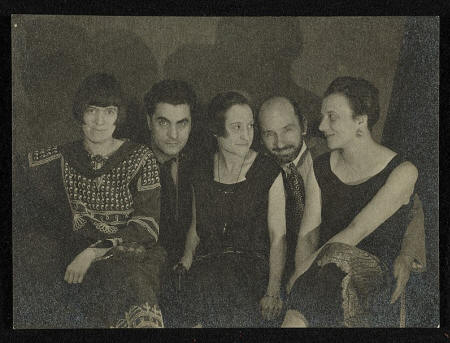

Queer Places:
Smith College (Seven Sisters), 9 Elm St, Northampton, MA 01063
110 W 88th St, New York, NY 10024
MacDowell Colony, 100 High St, Peterborough, NH 03458
 Louise
Varèse (née McCutcheon), also Louise Norton, Louise Norton-Varèse, (20
November 1890 – 1 July 1989)[1][2] was
an American writer, editor, and translator of French literature who was
involved with New York Dadaism.
Louise
Varèse (née McCutcheon), also Louise Norton, Louise Norton-Varèse, (20
November 1890 – 1 July 1989)[1][2] was
an American writer, editor, and translator of French literature who was
involved with New York Dadaism.
Varèse was born Louise McCutcheon in Pittsburgh, Pennsylvania, to John Lindsay McCutcheon and Mary Louise Taylor.[1] She attended Smith College (class of 1912), but left in the fall of 1911 to marry Allen Norton.[1]
She edited the modernist magazine Rogue (a play off of Vogue) with her then husband, Allen Norton, from 1915 to 1916. She sometimes wrote under the "pseudonym Dame Rogue".[3] She was also a contributor to the New York Dada magazine The Blind Man.[4] Varèse (then Norton) met Marcel Duchamp in 1915 and became close friends.[2] She was involved in the 1917 Society of Independent Artists submission of a urinal under the name R.Mutt known as Fountain.[5] She wrote a defense of the work titled "Buddha of the Bathroom" in issue 2 of The Blind Man.[6] Her address also appears on the label of Fountain as seen in the Alfred Stieglitz photograph of the work and her phone number was given as an alternative to Duchamp's as press contact.[7][8] As such, she is a likely candidate for the "female friend" Duchamp mentions in a letter dated 11 April 1917 to his sister Suzanne: "Une de mes amies sous un pseudonyme masculin, Richard Mutt, avait envoyé une pissotière en porcelaine comme sculpture" ("One of my female friends under a masculine pseudonym, Richard Mutt, sent in a porcelain urinal as a sculpture.").[7][9] Varèse translated poetry and other works by Charles Baudelaire, Julien Gracq, Saint-John Perse, Marcel Proust, Arthur Rimbaud, Georges Simenon, and Stendhal.[10] Her translations of the work of Arthur Rimbaud for James Laughlin's New Directions imprint were particularly influential. In 1956, she translated the section "The Great Improvisation" from Adam Mickiewicz's poetic drama Dziady. In 1972, she wrote a biography of her late second husband, Edgard Varèse, titled: Varèse: A Looking-Glass Diary.[11] For the exhibition Marcel Duchamp at the Philadelphia Museum of Art in 1973, Varèse wrote an essay titled Marcel Duchamp at Play.[12]

1924 group photo of Louise Varèse, Edgard Varèse, Suzanne Duchamp, Jean Crotti, and Mary Reynolds
Her first husband was poet and literary editor Allen Norton, the couple had a son, Michael in 1912, separated in 1916, and divorced in 1920. Louise also had a granddaughter, Sylvia Calderwood (1930–1974).[11] In 1922 she married composer Edgard Varèse, they remained together until his death in 1965.[1]
Varèse died on July 1, 1989 at the age of 98 in Eugene, Oregon.[11]
In 1948, Varèse was awarded the Denyse Clairouin Award for her translation of Paris Spleen by Baudelaire.[11] She was awarded the Chevalier de l'Ordre des Arts et des Lettres in 1969. Varèse was awarded MacDowell fellowships from 1967 through 1975.[13]
My published books: